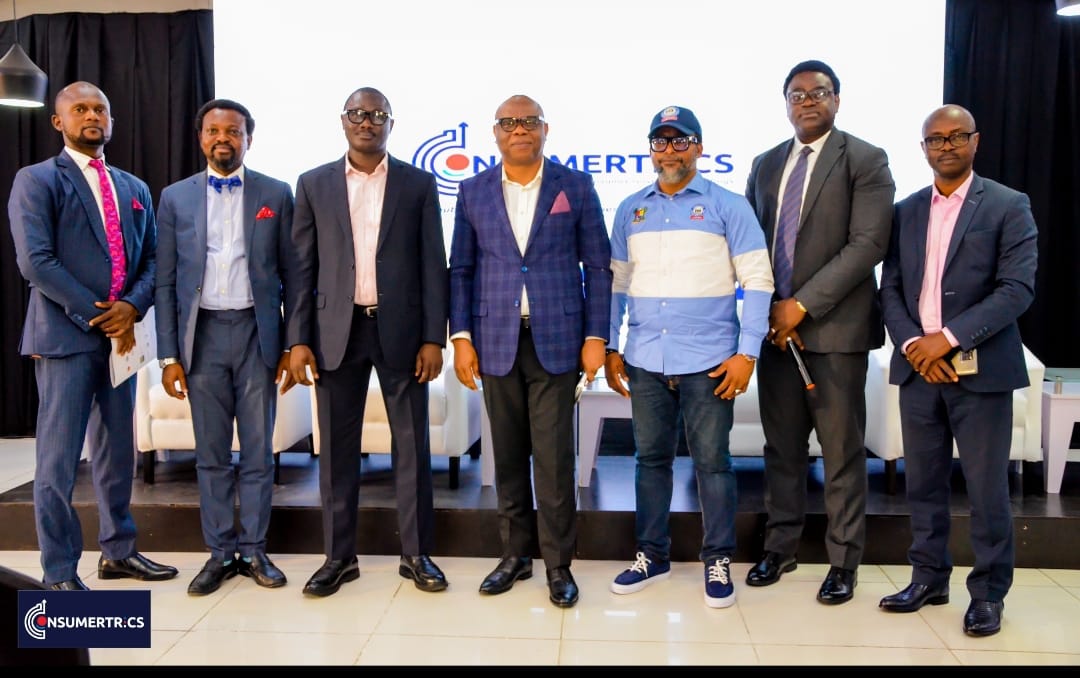Experts Proffer Solutions To Data Breach By Loan Sharks
The Chief Executive Officer of the Consumertrics, Barrister Muyiwa Ayojimi at the weekend brought together experts at a workshop that spoke on unethical practices of many loan sharks and the usual breach of financial consumers’ data privacies and why Nigerians must improve borrower lender relationship.
At the maiden workshop, Yinka Kolawole Examined the issues involved.
However during the exercise, Participants at the maiden Consumertrics workshop advocated proper regulation of digital loan sharks.
The experts, who spoke on the theme Responsible Borrowing and Lending: Balancing Access to Credit and Consumer Protection, deplored the unethical practices of many loan sharks and the usual breach of financial consumers’ data privacies.
Muyiwa Ayojimi, the CEO of Consumertrics, called for tougher application of consumer protection laws.

L-R: Segun Adeniyi, Chief Digital Officer, Wema Bank Plc; Muyiwa Ayojimi, CEO, Consumertrics; Olawale Eleto: Head of Credit Analysis for Business Banking, Union Bank Plc; Adolphus Aletor, CEO, Rigo Microfinance Bank; Afọlábí Solebo, GM, Lagos State Consumer Protection Agency (LASCOPA); Femi Oguntokun; Dọtun Adekanmbi, Chairman, Editorial Board, Consumertrics.

He stated that banks’ stringent loan processes have erected barriers within the country’s huge credit market, thereby giving rise to the proliferation of illegal loan sharks.
According to him “We are excited to have you all here to participate in the Consumer Advisory Series organized by Consumertrics.
He emphasised i would like to specially acknowledge the Consumertrics team who have worked tirelessly from day one.
He posited that “our partners for the important roles they have played. We couldn’t have pulled off this event without their hard
work, dedication and support.
This advisory series is the 1st of a quarterly series and it seeks to address burning issues that affects the wellbeing of the Nigeria consumers on one hand and providers of goods and services on the other hand in a manner that fosters
a healthy and mutually beneficial relationship.
About Consumertrics.
CONCUMERTRICS is the leading Go-To-Hub firm with the mission to protect consumers and helping organizations
achieve consumer/customer satisfaction with high-impact solutions using research analytics, training and advocacy.
The firm’s core strength is in Consumer Governance and ratings deployed to evaluate the ethical behavior of
businesses against the rights of consumer in market spaces in Nigeria and across Africa.
The highlights of this event are the keynote speech from the EVC of FCCPC, brief presentations from the Lead
Speakers and conversations we would have on our theme: Responsible Borrowing and Lending – Balancing Access and Consumer Protection in Nigeria Digital economy.
There was 3 panel sessions that draw best practice from distinguished speakers and panelists on the sub-themes – Balancing Access, Ensuring Trust and Transparency
in Lending and the Importance of Protecting borrowers against data breach and fraud.
Ayojimi words about the digital lending space without pre-empting speakers and panelists.
He said Several interested parties often tout Nigeria as a massive market, with limited available data, paint a less flattering picture of Nigeria’s total addressable market (TAM) in economic realities.
Indeed the market is huge but, One way of growing a business is through loans. Credit increases the number of participants in the economy, and it fosters economic growth in any country
Nigeria’s consumer lending is expected to rise by 21.4 percent to N1. 74 trillion in 2021, from N1. 42 trillion in 2020,
according to a recent report by Euromonitor International, a London-based market research company
The business of lending in Nigeria has evolved from the traditional system to a more flexible and digitally enabled
system for a faster and more convenient process.
This evolution has attracted extensive participation in the lending sector spurring the growth of the Nigeria Domestic Credit by 16.2% YoY as at December 2021.
Nigeria’s credit market has a high barrier to entry caused by Banks, with the rise in innovative fintech companies
looking to play in the lending space, have an uphill task ahead that spans finance, technology, and data.
Payday lenders are stealing the limelight in Nigeria’s consumer credit space. In 2020, Carbon and Fairmoney, two of
Nigeria’s biggest lending providers, disbursed N62.4 billion worth of loans. When you factor in other huge players
like Branch or Aella credit, we could be hitting up N200 billion.
Consumertrics informal surveys show that the salaried worker takes an average of N25,000 in loans 6 times a year.
If 50% of Nigeria’s 64.4 million workforce take a loan of N23,000 six times a year, that will amount to N4.4 trillion.
There is a market and it must be governed responsibly to grow.
I hope that today inspires ideas and discussions around the ways we can improve the borrower and lender’s space
as clearly, improvements are needed in the digital lending and borrower’s space.
Today’s discussions will form part of the Responsible Financial Consumer Protection submissions to be collated by our team of rapporteurs for engagement with the relevant government authorities as we seek to issue an advisory
to strengthen the reliability and sustainability of the digital lending and borrowing space.
However, Mr. Babatunde Irukera, the CEO of the Federal Competition and Consumer Protection, (FCCPC), said that the practices of many digital lenders violate Section 17 of the FCCPC Act.
Irukera spoke through his representative Mr. Marvin Nadah, the deputy director- investigations and Enforcement at the Commission. Some of the violations, he said, include “high interest loan rate; payable default fee, and unethical loan recovery methods. He added the agency, the Central Bank of Nigeria (CBN), and other institutions are collaborating to ensure compliance to regulatory guidelines.
Mr. Clem Omife, deputy director consumer affairs representing the Executive Vice Chairman of the Nigerian Communications Commission (NCC) Professor Umar Dambatta, said the CBN needed to take a cue from its Kenyan counterpart on how it is regulating the digital lenders effectively.
Ridwan Oloyede, a data privacy professional, said some digital loan sharks use specific software that enable them monitor borrowers’ real-time phone activities. Oloyede explained that permissions consumers grant to loan sharks on their mobile phones make them vulnerable to data privacy breach. He urged state licensing digital lenders to carry out strict oversight, like federal counterparts.
Other panellists who spoke at the workshop included Dr. Jamelaah Sharieff-Ayedun, managing director of CreditRegistry; Mr. Femi Daniel, Mastercard’s lead regional privacy counsel (for Eastern Europe, Middle East, and Africa); Mr. Clem Baiye, a former National commissioner with NCC and Indepenedent director Transmission Company of Nigeria; Afolabi Solebo, the managing director of the Lagos state Consumer Protection Agency (LASCOPA); Mr. Olawale Eleto, Head Credit Analysis (for Business Banking), Union Bank of Nigeria Plc.
Consumertrics, a leading advocacy firm on consumer rights and protection, has advocated for the need to improve borrower lender relationship particularly in the digital space.
Speaking earlier at a press conference, the Chief Executive Officer of the Firm,Muyiwa Ayojimi said best practices needs to be developed and enshrined within the borrower lender space.
Ayojimi said there is an urgent need by Central Bank of Nigeria ( CBN ) to emplace effective regulation and supervision of the loan sharks operating in the country and the Nigeria Data Privacy Bureau in collaboration with the NCC to protect the Privacy of Consumers.
He lauded the recent interventions by the Federal Competition and Consumer Protection Commission (FCCPC) to rein in the loan sharks over the deplorable act.
According to him “ That more Nigerians can now access easy and quick credit through the digital lenders is commendable. Importantly, the growing number of loan sharks suggests a considerable credit market, which therefore calls for a structuring that centers around balancing credit access with consumer protection,” he said.
He added that the resort to public shaming debtors is usually traumatic for debtors and could lead to their taking life-threatening decisions.
He added that both borrowers and lenders have specific obligations to fulfil before and after consummating a loan facility, in line with globally acceptable guidelines on Financial Consumer Protection.
Ayojimi said the development is why Consumertrics is holding its maiden advisory series- Themed: Responsible Borrowing and Lending: Balancing Access to Credit and Consumer Protection in Nigeria Digital Economy, holds September 8 at The Zone Tech Park, Gbagada, in Lagos.
Also a keynote address would be given by Mr Babatunde Irukera, the Executive Vice Chairman/ CEO, FCCPC.
However there would be 3 panel sessions with sub-topics on Responsible Borrowing and Lending, Ensuring Trust and Transparency in Lending and the importance of protecting borrowers against data breach and fraud.
Other key speakers and panelists are Femi Daniel, Regional Privacy Counsel, (Eastern Europe, Middle East, and Africa) for Mastercard; Dr. Jamelaah Sharieff-Ayedun, MD, CreditRegistry; Mr. Afolabi Solebo, GM-LASCOPA, Mr. Wole Ajimisinmi, Executive Director Wema Bank; Aldolphus Aletor, MD Rigo Microfinance Bank, Mr. Wale Adekola, Director-Center for Consumer Concern amongst others.
Background
Digitalisation in form of technological innovation is having an ongoing transformative impact on societies and economies.
In relation to financial services, digitalisation has significantly affected all sectors ranging from payments to banking and saving to insurance to investing, with the emergence of many new products, services, distribution models by existing market players and new entrants such as tech companies both large and small.
One way of accessing capital is access to loan, Credit increases the number of participants in the economy, and it fosters economic growth in any country. With Nigeria’s consumer lending double digit rise year on year, the business of lending in Nigeria has evolved from the traditional system to a more flexible and digitally enabled system for a faster and more convenient process.
This evolution has attracted extensive participation in the lending sector spurring the growth of the Nigeria Domestic Credit by 16.2% YoY as at December 2021
Nigeria’s credit market has a high barrier to entry caused by Banks, with the rise in innovative fintech companies looking to play in the lending space, have an uphill task ahead that spans finance, technology, and data.
Lendsqr’s informal surveys show that the salaried worker takes an average of N23,000 in loans 6 times a year. If 50% of Nigeria’s 64.4 million workforce take a loan of N23,000 six times a year, that will amount to N4.4 trillion. Digital money lenders have expanded lending to the unbanked as well as underbanked consumers and businesses who can hardly access formal credit.
The discussion around digital lending as advocated by CONSUMERTRICS is on setting responsible/best practices by the digital lenders, as banks and mainstream financial services providers, may not serve them soon.
As seen lately, mainstream banks have also adopted this model of lending as a way of growing their loan book and penetrating the market, meaning this is a highly promising space and should be adequately regulated.
Responsible lending practice must be developed around; Unscrupulous collection methods, Insufficient information on terms and conditions.
Highly aggressive and misleading advertisement strategies. Digital lenders should be able to address these irresponsible practices by; Having a risk-based pricing model with reasonable rates prorated annually, Providing adequate repayment periods for the clients, Having the right products for the right customers based on their needs, Having pressure-free loans, Designing appropriate and responsible marketing strategies.
Digital credit customers in Nigeria markets are facing diverse and numerous financial consumer protection challenges and that is why CONSUMERTRICS is partnering with other Private sector think tanks on its Advocacy series to discuss the rights of the borrowers and the true cost of credit and proper debt collection practices of lenders.















Post Comment